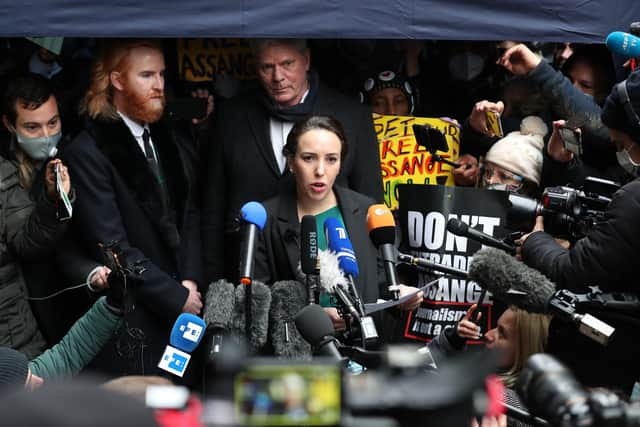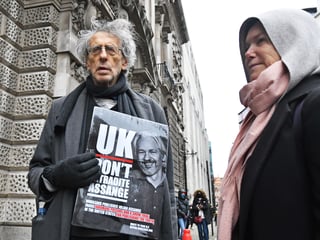Julian Assange's extradition to US denied on the basis of law not politics – Dr Paul Arnell


The latest stage in the case played out in London’s Old Bailey when, in a surprising decision, District Judge Vanessa Baraitser denied the US request to hand over the Wikileaks founder.
The judge accepted that Assange suffered from a form of autism and clinical depression and was a suicide risk. His risk of suicide would be increased, she held, on account of the conditions he would be held in the United States.
Advertisement
Hide AdAdvertisement
Hide AdThese included near total isolation and the absence of protective factors akin to those in Belmarsh prison where he is presently held. She concluded that if he was extradited his mental health would deteriorate and cause him to take his own life with the single-minded determination of his autism spectrum disorder.
The governing law, the Extradition Act 2003, provides that an extradition is barred if it is oppressive on the grounds of mental and physical health. This turned out to be the operative provision in Assange’s case.
The district judge’s decision on the point is somewhat surprising. There is a considerable body of case law that has developed where requested persons such as Assange have argued on the basis of their mental health. The success of such arguments is rare. Courts have consistently emphasised that a high threshold must be met in order to stop an extradition in such a case.
The usual practice where mental health arguments are put forward by a requested person is for the UK to seek assurances from the requesting country stipulating the particular conditions and treatment the individual will be afforded if sent.


The availability of certain medications, qualified psychiatrists, and suicide prevention policies for example. Upon receipt of sufficient and bona fide information on these and similar points the UK would normally proceed with the extradition.
In the present case what happened was that the judge conflated Assange’s risk of suicide with his autism and intelligence. This meant that, in her view, he would be so determined and able that the actions taken to prevent him from taking his life would be defeated.
The judge referred to several recent cases of suicides in US prisons, including that of Jeffery Epstein in August 2019. She held it would be oppressive to extradite, and the request was denied.
However, the celebrations following the decision are bound to be muted. Whilst undoubtedly a victory for Assange, two cautionary points must be made.
Advertisement
Hide AdAdvertisement
Hide AdFirstly, the US has already intimated that it will appeal the decision. Assange’s fate therefore remains uncertain. His incarceration in Belmarsh prison will continue at least until Wednesday, when a bail application will be heard.
Bail may well be denied Assange then. His applications have been refused in the past, in part on account of his conviction for breaching bail conditions in 2012 by entering the Ecuadorean embassy in 2012 to frustrate extradition to Sweden.
Regardless of bail, the district judge’s decision is not the end of the matter. As the US is appealing, Assange’s future will turn on a decision of the Divisional Court, and indeed perhaps even the UK Supreme Court or the European Court of Human Rights.
A second factor affecting possible celebrations is that the basis for Assange’s victory – the argument about the state of his mental health, under section 91 of the 2003 Act – was quite narrow. Whilst significant and in itself sufficient to block or bar Assange’s extradition, there were a number of other arguments made on his behalf that were rejected.
The right to a fair trial, the political offence exception, the right to family life of Assange, his partner and children, an abuse of process and the right to freedom of expression were all rejected by the judge as possible bars. The failure of these other arguments narrows the focus of the US appeal and arguably increases the chances of its success.
Indeed, the impact of the decision in a broader sense is to concentrate the considerable number of different issues put forward by Assange’s lawyers. His mental health, suicide risk and autism, and the efficacy of suicide prevention programmes in the American prison system are now central to possible future arguments.
These issues will firstly be the concern of the legal team acting on behalf of the US. They will construct an argument that there is an arguable case that the district judge erred in interpreting and applying the applicable mental health and suicide rules in Assange’s situation.
Assange’s legal team will, for a second time, then be faced with putting forward arguments about why his extradition should be refused – but now most likely restricted to the mental health-related points. The parameters of the debate for and against his extradition have narrowed considerably.
Advertisement
Hide AdAdvertisement
Hide AdThe case against Assange is conceived in a multitude of ways. It has become a touchstone for issues including attacks on press freedom, aspects of the US criminal justice system, the excesses or illegalities of US foreign policy, the weakening of the rule of law under the Trump administration and arguments over the lop-sided extradition arrangement between the UK and the US.
A number of these were put forward on behalf of Assange in front of the District Court. They were rightfully discounted. Governing proceedings alone were the rules within the Extradition Act of 2003. From Assange’s perspective they were enough, at least for the time being. Assange’s mental health led to the oppression bar being upheld and the American extradition request being denied.
Dr Paul Arnell, Law School, Robert Gordon University
